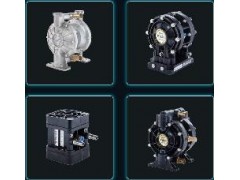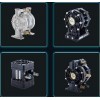Pneumatic diaphragm pump has four kinds of materials: plastic, aluminum alloy, cast iron, stainless steel. Diaphragm pump according to the different liquid media were used to nitrile rubber, chloroprene rubber, fluorine rubber, PTFE, poly ethylene 46. In order to meet the needs of different users. Placed in a variety of special occasions, for pumping of conventional pumps can not pump the medium, both with satisfactory results.
Pneumatic diaphragm pump working principle
1, compressed air as a driving force.
2, is a displacement of the diaphragm caused by the volume change of the volume of the pump, the working principle is similar to the plunger pump, due to the characteristics of the diaphragm pump works, so the diaphragm has the following characteristics:
(1) the pump will not overheat: compressed air for power, in the exhaust is an expansion of heat absorption process, the temperature is lower when the pneumatic pump, no harmful gas emissions.
(2) will not produce electric spark: pneumatic diaphragm pumps do not have electricity for power, grounding and then prevent the static spark
(3) liquid containing particles can be: because the volume of import
(4) low shear stress on the material: how the work of breathing in how how the spit, so the material stir minimum for unstable material conveying
(5) flow can be adjusted, you can add a throttle valve at the outlet of the material to adjust the flow rate.
(6) self priming.
(7) can be empty, and there will be no danger.
(8) diving work.
(9) fluid can be transported very widely, from low viscosity to high viscosity, from corrosive to viscous.
(10) no complex control systems, no cables, fuses, etc..
(11) small volume, light weight, easy to move.
(12) without lubrication maintenance is simple and will not work environment pollution due to leakage.
(13) the pump can always maintain high efficiency, and will not be reduced because of wear and tear.
(14) without a dynamic seal, the maintenance is simple and easy to avoid the leakage. Work without dead.





